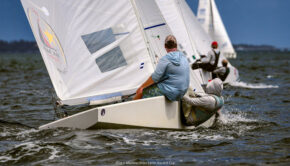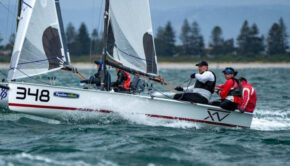The Secret to Raising a Prodigy
Published on June 3rd, 2018
Now 25 years old, American Justin Thomas is presently the #1 ranked golfer in the world. How did he get so good? What lessons can be applied to help develop the next generation of great sailors? This report by Brian Costa in The Wall Street Journal may surprise you.
The rise of Justin Thomas can be traced through the pro shop at Harmony Landing Country Club (Goshen, KY), where his father, Mike, is the head pro emeritus.
Among the items on display are signed balls from every tournament he has won dating to his junior golf days, 134 in total. The trophy Thomas received for winning the PGA Championship last summer sits above racks of shirts on sale.
But visitors wondering what the elder Thomas’s teaching secret was are often surprised by what they hear. More than any technical advice, Mike Thomas recalls contests in which the two of them would attempt the goofiest shots they could imagine: over or under a tree, closest to the pin without landing the ball on the green and so on.
“My goal with him was every time you come out here, we’re going to have fun,” Mike Thomas said. “It wasn’t instruction. It was fun. Then, I was able to sneak some instruction in just because he’d ask me.”
The history of sports prodigies is filled with parents who pushed hard and never relented. But Justin Thomas—at age 24, the No. 2 player in the world—is a byproduct of an approach that completely defies the one most commonly seen in elite youth sports.
One of the most qualified parent-coaches in sports raised a major champion by under-coaching him. This was partly by necessity. Mike Thomas’s job required him to spend most of his days teaching members of the club, set amid rolling hills and thoroughbred breeding farms outside Louisville.
But it was also by design. Because he had to ask before receiving a swing tip, Justin was allowed to develop two things on his own: first, a love for the game, and then a feel for it.
The effect wasn’t just the avoidance of mental burnout. It was a degree of self-reliance that made him an outlier in a game filled with players who need to look outside the ropes to correct a flaw.
Thomas’s best rounds have been historic but his defining rounds may be the ones in which he starts poorly, makes a change his peers wouldn’t dare attempt on the fly and finishes under par.
“People are always blown away by that,” Thomas said. “They’ll be like, ‘You’ll change your grip in the middle of a round?’ Well, what am I going to do, keep hitting it bad?”









 We’ll keep your information safe.
We’ll keep your information safe.